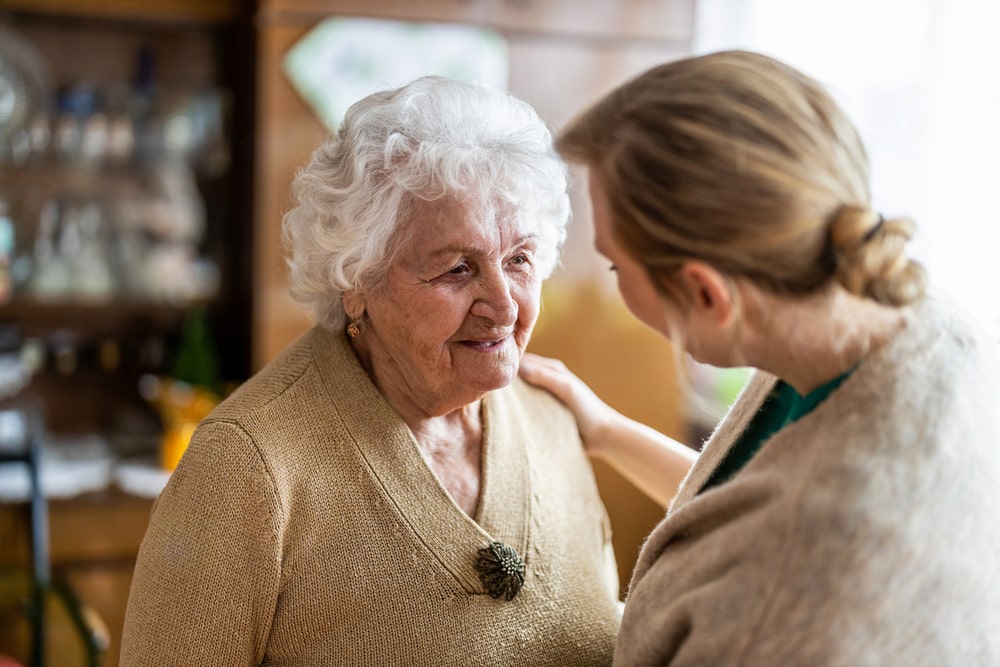When you or someone you love receives a terminal diagnosis, laughter may be the last thing on your mind. As the transition to end-of-life care begins, you may feel overwhelmed by various emotions, like fear, anger, sadness, or despair.
But a positive mindset and humor can improve the quality of life of a hospice patient, boost their physical and mental health, and help them cope with their new situation. As you and your family begin to process the terminal diagnosis, laughter – at appropriate times – can bring you together and help you grieve well.
Here are four ways laughter and humor benefit those in hospice care. Plus, make sure you read to the end for some helpful tips for creating a positive atmosphere during this difficult time!
Benefit #1: Laughter helps you cope

Coping with a terminal diagnosis can be difficult for both a hospice patient and their family. But humor can help you change your perspective and make the most of the time you have left together. While death is serious, end-of-life situations often come with weird, peculiar moments, and laughing at those situations can help you have a more positive mindset. Plus, humor is a positive coping skill that can show acceptance, rather than avoidance, of the situation.
Benefit #2: Laughter provides relief

Laughter can also benefit those in hospice by relieving stress and tension. When we’re in a stressful situation, we often hold in our emotions. These emotions build within us, creating pressure. Laughter releases that pressure and brings those emotions to the surface, providing relief from the stress and tension. This doesn’t mean that negative emotions disappear; instead, laughter helps us relax and cope with our emotions in a healthier way.
Benefit #3: Laughter boosts physical health

Most of us know the old cliche, “Laughter is the best medicine.” While this statement is an exaggeration, laughter does have some healing properties! Hospice is about improving a patient’s quality of life, and laughter can help. Laughter increases oxygen intake, which provides a boost for your internal organs, and it can alleviate pain by releasing positive endorphins. Plus, laughter helps boost your immune system, improve your blood flow, and burn calories – all of which can improve your health.
Benefit #4: Laughter connects you to others

Have you ever seen or read something so funny that you had to share it with someone else? Humor has a way of bringing people together and creating connections. Laughing with others helps you let down your walls and be less defensive, encouraging you to be more vulnerable. Laughter can also decrease loneliness, which can be a big problem for some hospice patients.
Laughing with others can also help decrease relationship tension and stress. During stressful situations, like coping with a terminal diagnosis, tensions can run high, creating conflict. Humor and laughter (at appropriate times) can alleviate tension in these difficult situations. Learning to make light of the awkward moments that may come with end-of-life care can help the patient, family, and hospice workers feel more comfortable with each other.
How can you create a more positive atmosphere?

After you or a loved one receives a terminal diagnosis, it may be hard to find ways to laugh. Here are a few different ways to incorporate more humor into your daily life.
- Find humor in situations. Little funny things happen around us all the time, and finding humor in those moments is great! Just make sure that you’re laughing with someone, not at them.
- Watch a funny TV show, movie, or video. Everyone has a different type of humor that makes them laugh. You can watch a favorite movie that you’ve always found funny or try something new!
- Talk with kids. Kids can say the silliest things sometimes. If you have kids, grandkids, or know anyone with kids, take time to talk to them, play with them, and ask them questions.
- Have a game night. Playing games with friends and family can often lead to shenanigans. Just stay away from Uno Draw Fours and Monopoly’s Boardwalk!
- Share a cheesy joke. The best part of telling someone a cheesy joke or terrible pun is making yourself laugh! Even if no one else finds the joke funny, their groans are sure to make you laugh.
As you look to laugh more, remember that timing matters! Not everyone will feel like laughing during this time, and it’s important to be sensitive to the emotions of those around you – whether you’re the patient or your loved one is. Above all, focus on using laughter to create a positive atmosphere and mindset to make this difficult time a little easier for everyone.




